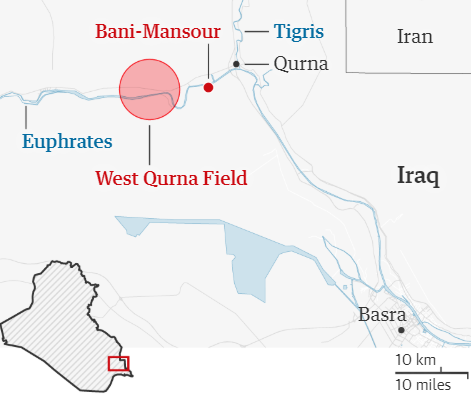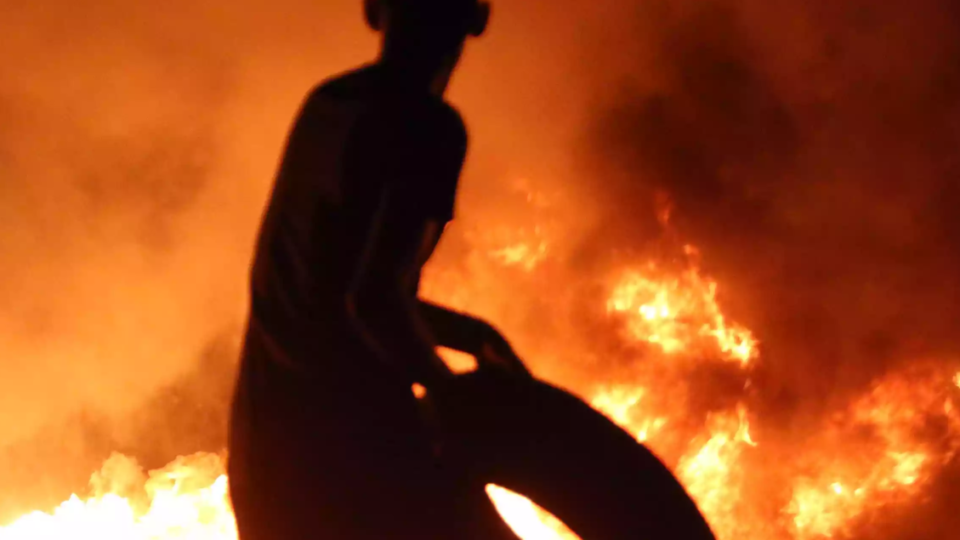‘Iraq is Dying’: Oil Flows Freely but Corruption Fuels Growing Anger
by Ghaith Abdul-Ahad in Bani-Mansour
The land of the Bani-Mansour clan north-east of Basra is flat and parched, spattered with dry crusts of salt and thorny shrubs. Clusters of palm trees form small patches of green in the otherwise dusty yellow and brown landscape.
Nestled among them are about a dozen berms, each enclosing an oil well and its pump. Pipelines snake over the ground, cutting through villages as they connect wells and pumping stations. Oil rigs tower over the southern Iraq landscape, sending plumes of thick black smoke across the horizon.
The land sits above the West Qurna oilfield. One of the most lucrative in the world, it is owned by the Iraqi government and run by Exxon Mobil. After years of sanctions and neglect, oil production in southern Iraq is picking up. A two-lane road that crosses the Bani-Mansour land has become a busy highway for lorries carrying drilling equipment and buses ferrying foreign oil workers back and forth. The windows of nearby homes rattle as the traffic passes.
The opening up of Iraq’s enormous verified oil reserves to foreign expertise in the aftermath of the fall of Saddam Hussein was hailed as the means to kickstart its economy and potentially transform the south into an economic stronghold. Instead, ordinary Iraqis have seen little or no benefit from the proceeds of the country’s multibillion-dollar oil industry, much of which has been siphoned off by corrupt politicians. Across the south in recent months, simmering anger over corruption and unemployment has been fuelled by the dire state of public services, regular power cuts and water shortages.

Once there was a time when the Bani-Mansour land, not far from where the Tigris and Euphrates meet, had water and more than 300,000 palm trees, villagers said. Large numbers of buffaloes and cows cooled themselves in the green muddy waters of its canals.

But drought and the intrusion of saltwater from the Gulf have wiped out most of the palm groves, the cattle have been sold, local rivers have dried up and the canals have stagnated, clogged with rubbish. Corruption and mismanagement on the part of local and central government, both dominated by a kleptocracy of religious parties that have ruled Iraq for more than a decade, has exacerbated a slow-motion environmental disaster.
 The oil companies, which are supposed to train and hire a workforce from local populations and invest back into development projects, are forced to hire those with connections to powerful tribal sheikhs and the Islamist parties. Funds for those populations rarely materialise and almost none of the oil revenuestrickle down to the population. Meanwhile, local militias with links to clans and political parties have formed their own companies, which land lucrative security contracts with subsidiaries of foreign oil firms.
The oil companies, which are supposed to train and hire a workforce from local populations and invest back into development projects, are forced to hire those with connections to powerful tribal sheikhs and the Islamist parties. Funds for those populations rarely materialise and almost none of the oil revenuestrickle down to the population. Meanwhile, local militias with links to clans and political parties have formed their own companies, which land lucrative security contracts with subsidiaries of foreign oil firms.
In the eyes of the local villagers, the heavy traffic rumbling along the narrow road has become a daily reminder of the contrast between the boundless wealth lying underneath their homes and the abject poverty above ground.





